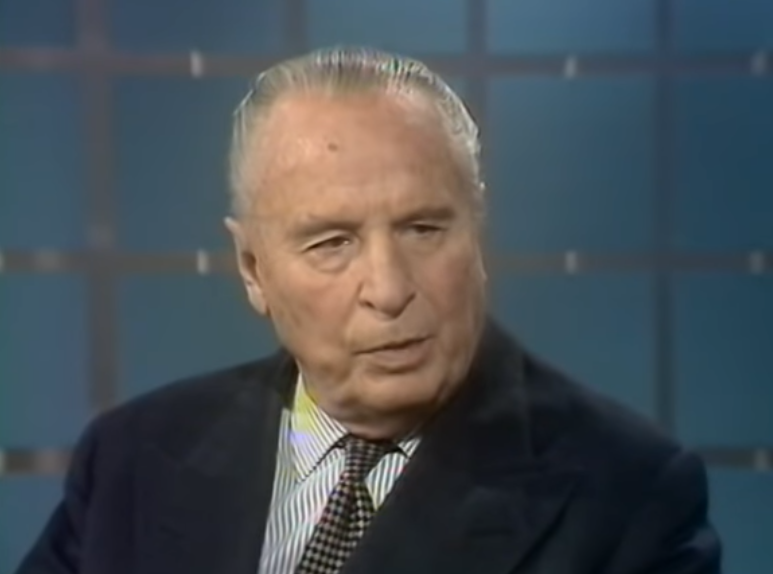
For a decade, or more, the slur words of choice from an intolerant left, seeking to silence debate, have been "fascist" and "Nazi". They use them to signify a political view entirely without decency and characterised by a callous disregard for the weak. It is equated with the "far-right", the third item in the trilogy of denunciation. But what do these terms actually mean?
The historical Fascists generally came from the left of politics. This fact alone should cause us to question the left-narrative. Mussolini was a political journalist, intellectual and socialist. Britain's Oswald Mosley was a Labour Party MP and Chancellor of the Duchy of Lancaster in the administration of Ramsay MacDonald.
The following interview is worth watching in full. It dates from 1975, when Mosley, despite approaching 80, still expected to be recalled and embraced as the saviour of his nation. His reasoning and beliefs are proudly on display and they are not at all what one might expect.
I would summarise his world-view as follows:
- He recognises an in-group, separate from the portion of humanity outside the defined parameters.
- He espouses compassion for this in-group and seeks to further their welfare and well-being. This emotional and compassionate response is, I think, genuine.
- He makes fundamental errors in economics which lead him to conclude that only state intervention for, and on behalf of, the in-group can save them from disaster. This results in a Darwinist, survival-of-the-fittest approach and a determination that state intervention is essential.
The result of his reasoning, and in particular of his economic error, is a conclusion very close to that reached by Mussolini, who summarised it as follows:
Everything within the state, nothing outside the state, nothing against the state
I would, therefore, define fascism as a political ideology that possesses three essential features:
- In-group preference
- Compassion
- Economic error
These three traits create fascism as a political movement, despite their apparently innocuous nature. The separation between the in-group and the rest creates the potential; the compassion creates the motivation; and the economic error provides the mechanism. Fascism, as a movement, needs all three to succeed.
This is quite different from what is asserted in the common narrative, of course. It is compassion, not callousness, that is the motivational force. Compassion can be virtuous, but it can also be harmful. Most of all, it can be highly aggressive when the object of that compassion is threatened. Most notable of all, as the motivation considers itself intrinsically good, it tends to excess and lacks any restraint when applying its 'benefits' to society.
Politically, fascism tends to advocate such things as socialised healthcare, the welfare state and security at home and abroad. It opposes the small-government, lassez-faire approach of the classical liberals. Instead, it advocates some or all of: government spending and borrowing, militarism, imperialism, and a planned economy. It often also advocates a "new economics" as intellectual cover for the core error that propels each and every policy development.
In contemporary politics, the presence of these features of fascism, placing it on the left, is being increasingly noticed by commentators and comics who find themselves in the excluded group and who, in response, are starting to ask questions. One such is a musician and comedian, Daniel Bostock, who explores these issues by using parody songs.
What, then, is Nazism? There are no public advocates for it that match Mosley in eloquence. Nevertheless, it seems to be a variation on the theme, with the in-group being more rigidly defined on ethnic lines. The Darwinist idea of competition and favoured races seems also to come to the fore. If the separation between an in-group and an out-group creates the potential for fascism, then Nazism's selection of its groups may be seen as particularly extreme, generating a correspondingly high voltage to energise its political Frankenstein.
And is any of this "right", let alone "far right"? I would argue not. On the left-right political spectrum, this might be viewed as left-wing or it might be viewed as centrist. But right-wing? No. Why, then, do all mainstream political parties in the UK warn of the "far right"? There seem to be three reasons:
- It can be used to demonise and exclude anyone challenging the current political milieu.
- It distracts the public from those elements of fascism which are central to each mainstream party's programme and beliefs.
- It allows easy virtue signalling by politicians who can attack a term, "fascist", no longer defended by anyone, even as they adopt more and more of the policies of that very movement.
Daniel Bostock covered this area too in a parody song. The range of politicians illustrated in this video is very revealing:
Who, then, are the fascists? Go to any Western parliament and you will be surrounded by them. Go to a hustings and ask yourself three questions of the candidates:
- Do they have a preference for an in-group?
- Do they espouse overt compassion for this group?
- Do they advocate state intervention and / or a new economics?
If you answer yes to all three, you are looking at a fascist.

